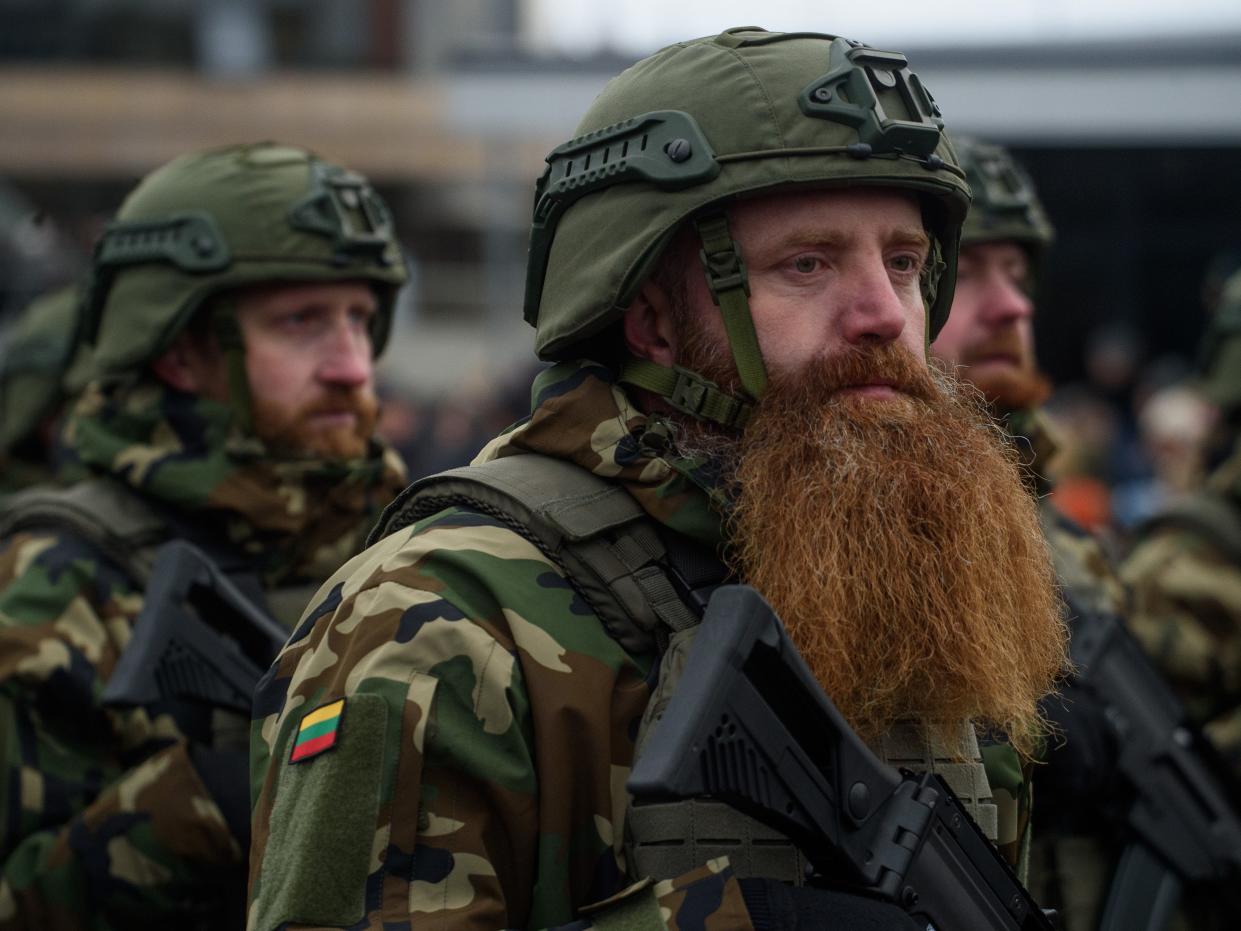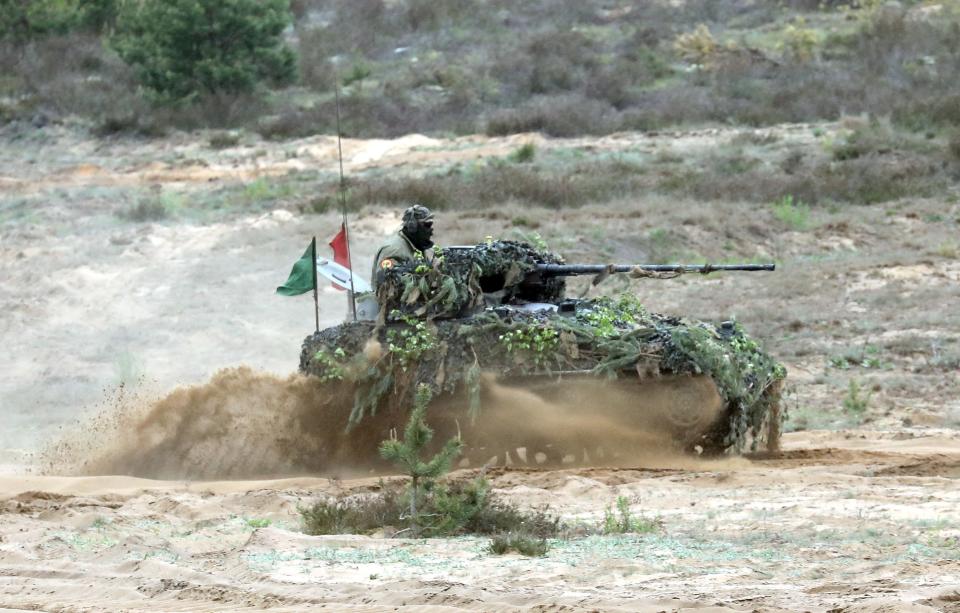Baltic officials say they could send troops to Ukraine without waiting for NATO if Russia scores a breakthrough: report

Baltic officials told German representatives they might send troops to Ukraine, Der Spiegel reported.
The report says their condition for moving in troops is if Russia achieves a breakthrough in the war.
The warning was part of an argument for Germany to up its support in Ukraine, the outlet reported.
Members of parliament for the Baltic states warned German officials last week that their governments were poised to send troops to Ukraine if Russia achieved considerable gains, Der Spiegel reported.
The German outlet reported Sunday that the Baltic officials issued the warning while speaking with representatives for Berlin at the Lennart Meri Conference in Tallinn, Estonia.
Der Spiegel neither named any of the officials nor identified which countries they represented but said they raised concerns about German Chancellor Olaf Scholz's current policy toward the war.
Scholz has been denying Ukraine permission to use German-supplied weapons in strikes on Russian soil, in line with Washington's stance of not allowing Kyiv to use donated weaponry for attacks beyond Ukraine's own borders.
Der Spiegel reported that the Baltic officials were concerned that such policies created a half-hearted attempt to help Kyiv and might allow Russia to gain the upper hand in Ukraine.
They said that if Moscow did gain significant ground in eastern Ukraine, their governments and Poland could move troops into the conflict zone even before Russia deployed its soldiers on their borders, the outlet reported.
The officials' argument, Der Spiegel reported, was that treating Moscow with restraint could backfire and instead create an escalation.

Like Ukraine, the Baltic states — Estonia, Latvia, and Lithuania — were previously part of the Soviet Union.
They've been some of NATO's most vocal members in pushing the rest of the alliance to intensify support for Kyiv, fearing that Russian President Vladimir Putin may seek to continue his conquest in the region if he seizes Ukraine.
Together with French President Emmanuel Macron, they've repeatedly hinted that they aren't ruling out sending NATO troops to Ukraine.
Officials in Estonia recently signaled the possibility of deploying its troops to fill non-combat roles and free up Ukrainians to fight on the front lines. There are concerns that such actions could escalate the conflict quickly into a direct war between NATO and Russia.
A spokesperson for Estonia's defense ministry told Business Insider the country wasn't discussing deploying troops to Ukraine for active combat roles.
"Tomorrow, the EU defense ministers will discuss the expansion of the EU training mission EUMAM, which until now has trained Ukrainian combatants on EU territory," the spokesperson said, referring to the European Union Military Assistance Mission in support of Ukraine. "The discussion will mostly focus on the quantity of personnel to be trained. However, it may also touch on the location of the training."
When contacted by BI, a spokesperson for Poland's ministry of national defense said: "We are not considering the idea of sending Polish soldiers to Ukraine, so it is difficult for us to comment on such media reports."
Press services for the defense ministries of Latvia and Lithuania didn't immediately respond to requests for comment sent by Business Insider outside regular business hours.
Why Russia's western neighbors are getting skittish
The concerns reported by Der Spiegel have come after Russia launched a renewed assault in northeastern Ukraine, striking the city of Kharkiv and capturing several settlements in the surrounding region.
Military observers say the Kremlin can't take Kharkiv with the resources it's deployed there so far, but Russia has been shelling the city and inflicting civilian casualties.
On the main front in the east, Ukraine has been struggling for months to hold back a grinding Russian advance after its supplies from the US began to dwindle.
The aid has resumed after months of stalling in Congress, but Kyiv says Western equipment often arrives too late to turn the tide of the war because conditions keep changing.

Russia meanwhile stoked alarm among its neighbors last week with a draft proposal from its defense ministry to change its maritime borders with Finland and Lithuania in January 2025.
The draft was uploaded to Russia's registry of laws on Tuesday but was later removed.
On Thursday, Tallinn officials said Moscow had removed 24 of 50 buoys marking Russia's borders with Estonia on the Narva River. The officials said Russia had been contesting the buoys' locations.
On Sunday, six NATO nations — Norway, Poland, Finland, Estonia, Latvia, and Lithuania — said they'd construct a unified "drone wall" with unmanned aerial vehicles and more advanced technologies to strengthen their borders.
Their concerns aren't just centered on a full-scale Russian invasion. Finland, for example, said Russia had been trying to overwhelm Finnish border officials with waves of migrants trying to enter its borders.
Norway, Finland, Estonia, and Latvia share land borders with mainland Russia, and Poland and Lithuania share land borders with Belarus, a close ally of the Kremlin.
Correction: May 27, 2024 — A previous version of this story incorrectly stated that Poland was once part of the Soviet Union. This story has also been updated to reflect comments from the Polish and Estonian defense ministries.
Read the original article on Business Insider


